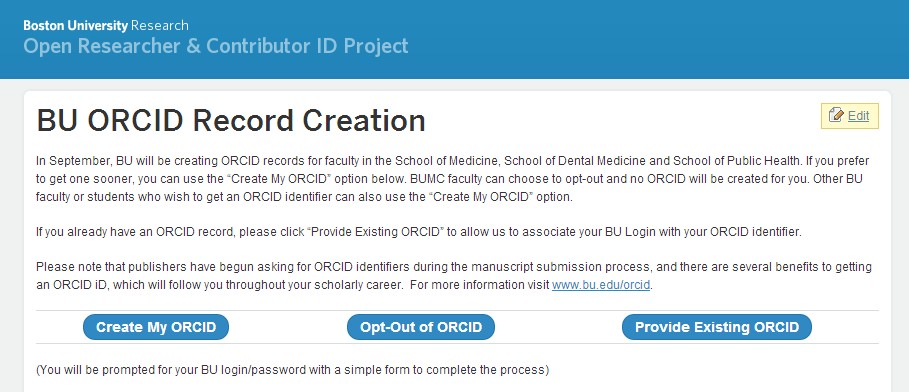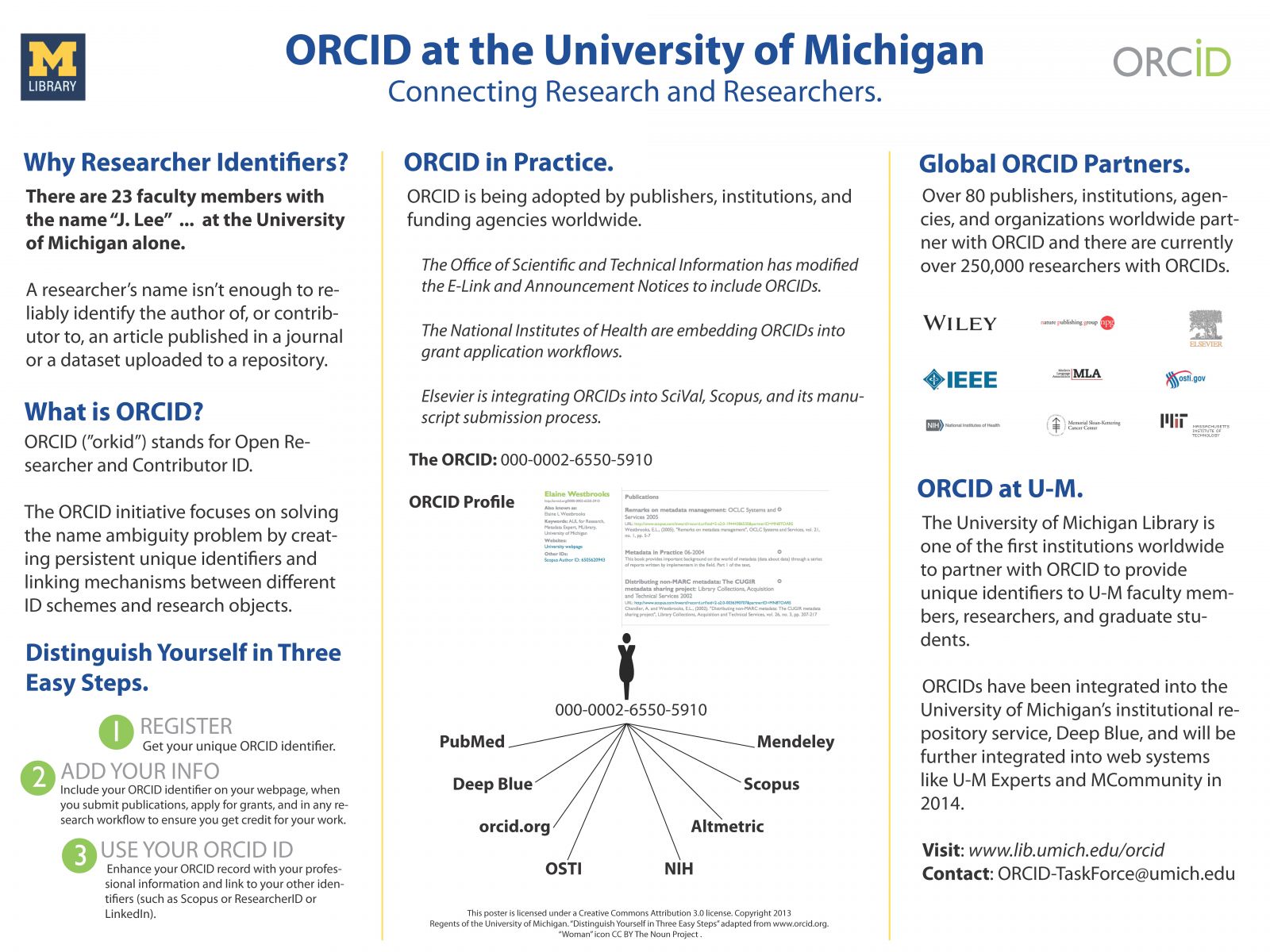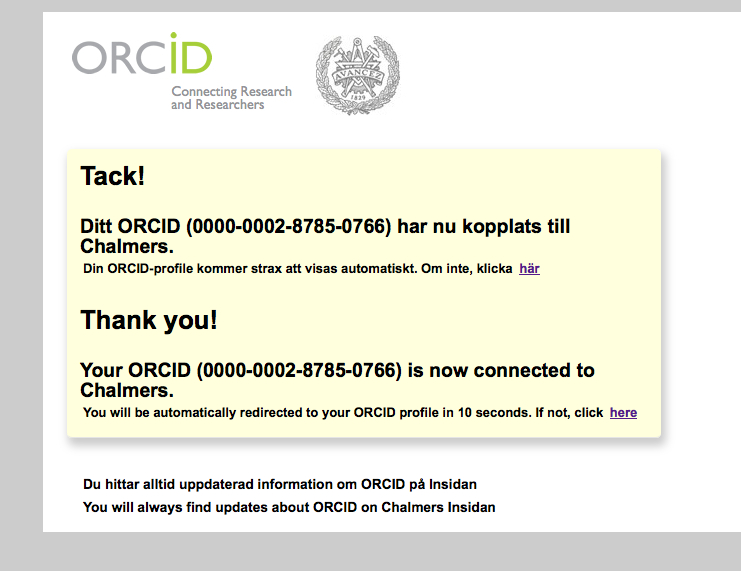In the last few weeks ORCID has seen its first integrations within universities and research institutes, with more than 2000 ORCID iDs created by member institutions using the ORCID API. In the U.S., Boston University has created ORCID iDs for the faculty in its medical center and the University of Michigan has conducted a beta test by creating ORCID iDs for faculty in its library. In Europe, Chalmers University of Technology has piloted the creation of ORCID iDs for its faculty, researchers, and graduate students, and several universities in Spain and the UK are starting to integrate ORCID identifiers. The University of Hong Kong is creating ORCID iDs for its faculty this fall.
Creating ORCID identifiers at Boston University

In late August, all Boston University Medical Center faculty received an email from Provost Karen Antman, explaining that Boston University would be creating ORCID iDs for medical center faculty, populating their ORCID record with biographical and publications information from the BU Profiles researcher information system, and providing an overview of ORCID for BU faculty. Boston University provided faculty with the opportunity to opt out if they didn’t want an ORCID record created, but none did, and thirty days later, BU created iDs for the entire population invited to participate. Chris Dorney, Director of Application Services at BUMC says of their integration, “We are always looking for ways to minimize faculty effort. ORCID has the potential to do this as well as to improve disambiguation. By pre-populating with the information we have in Profiles, we were able to save our faculty time. And the more people on board with ORCID in general, the more it will help people find collaborators.”
Prior to its integration, BUMC project staff engaged with stakeholders throughout their campus community, sharing information about the importance of ORCID for name disambiguation, discussing legal and policy implications, and determining the best way to approach the creation of ORCID iDs for researchers on their campus. Through their discussions, BUMC determined to create iDs for faculty only, on an opt out basis, and they were thoughtful in the advance communications they sent to faculty to explain the benefits of ORCID. BU presented on their approach at the May 2013 Outreach Meeting, and have served as a resource to other institutions considering ORCID record creation and integration.
As part of the Sloan Foundation-funded ORCID Adoption and Integration Program, Boston University will be creating ORCID iDs this spring for faculty on its Charles River campus (arts and sciences) and promoting adoption among its postdocs, graduate students, and undergraduates.
Other institutions in U.S., Europe, and Asia creating ORCID iDs for researchers

University of Michigan and Chalmers University of Technology have been test-launching integrations of ORCID identifiers for populations on their campuses. Michigan, preparing for its institution-wide integration, has created ORCID iDs for all members of its library faculty and has integrated an ORCID field into its Deep Blue institutional repository. ORCID Ambassador Merle Rosenzweig is actively involved with the Michigan integration, working to educate researchers on campus and regionally.
At Chalmers University in Sweden, project leaders are working directly with the department of Earth and Space Sciences on a pilot with about 100 researchers to educate them about ORCID and facilitate the creation of ORCID iDs. This is the first step in a campuswide effort to educate the Chalmers research community about ORCID and integrate into its local IT infrastructure, including an institutional repository and human resources system. Like the other institutions mentioned here, Chalmers is also reviewing its processes for onboarding new researchers, incorporating the collection of ORCID iDs into those processes.
In Spain, there is a clear readiness to incorporate ORCID identifiers in a variety of systems and processes. Universidad Oviedo, Universidad Zaragoza, and Universidad Carlos III de Madrid are ORCID members and are testing the ORCID record creation process for faculty, with plans to launch early in 2014. Other universities are in the process of becoming members. Sigma, a non-profit current research information system (CRIS) system vendor that supports a number of Spanish universities, plans to support ORCID identifiers in their products. They join ORCID members Avedas and Symplectic in providing vendor-based CRIS solutions that have developed functionality that leverages ORCID iDs.
The University of Hong Kong will begin creating ORCID iDs for its faculty this fall, on an opt-out basis. HKU is integrating with their institutional repository, the HKU Scholars Hub, which strives to increase the visibility of HKU authors and to facilitate collaborations. This is a first step towards full integration with a new CRIS system being implemented at HKU.

Other institutions like the NYU Langone Medical Center and the Fred Hutchinson Cancer Research Center plan to begin creating ORCID identifiers for their researchers in early 2014. NYU project lead Theodora Baker, Assistant Director of Knowledge Informatics, says of their implementation, “Our project will make ORCID adoption very easy for our researchers. At NYU we have a tremendous amount of data about our researchers and their outputs at our fingert
ips, and this effort is helping us to not only pull those systems together, but ultimately to make it much easier for researchers to maintain their records.”
Watch for more integrations to come
Many more integrations at universities and research institutes are planned or in development, including several of our Alfred P. Sloan Foundation-funded Adoption and Integration Program partners from U.S. institutions–this includes not only ORCID iD creation but also integration into institutional repositories, researcher information platforms, HR systems, campus directories and more. While initial integrations have created records primarily for faculty, institutions like Texas A&M are planning to create ORCID iDs for graduate students and postdoctoral researchers, linking ORCID iDs directly to campus directory information which will in turn facilitate integration with a host of systems on campus. The recent Jisc ORCID implementation group report provides an overview of what many UK institutions are planning, including ORCID record creation on several campuses.
You can check the status of integrations on our web site. As institutions create ORCID iDs for their researchers and conduct outreach activities to faculty, postdoctoral researchers, and students, we continue to build our documentation to support these efforts. To learn more about how you can create records for researchers at your institution, we invite you to review our ORCID member integration guide, check out our open documentation, request sandbox credentials for developers, and become a member. We also encourage you to attend out May 2014 Outreach meeting, which will be focused on university integrations, and you can contact us at [email protected].
